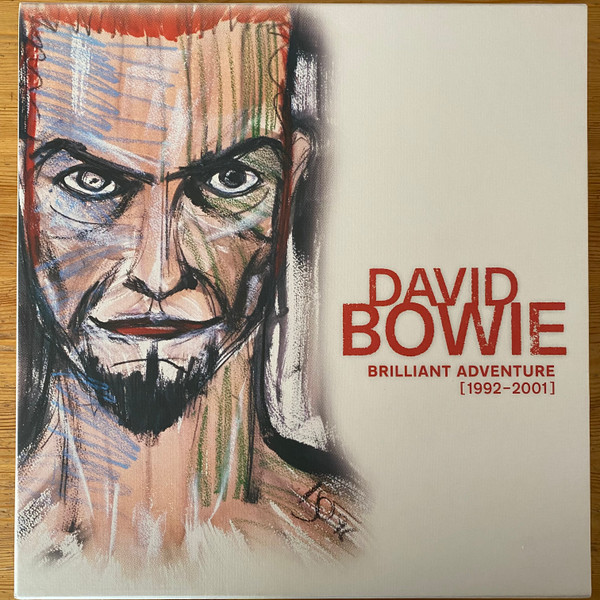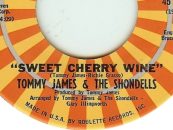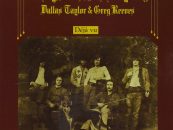 Shortly before cancer ended David Bowie’s life in 2016, his record company began issuing a series of boxed sets that deliver remasters of his studio albums alongside previously unreleased concert and studio material. First came Five Years (1969–1973), then Who Can I Be Now? (1974–76), A New Career in a New Town (1977–1982), Loving the Alien (1983–1988), and now Brilliant Adventure (1992–2001).
Shortly before cancer ended David Bowie’s life in 2016, his record company began issuing a series of boxed sets that deliver remasters of his studio albums alongside previously unreleased concert and studio material. First came Five Years (1969–1973), then Who Can I Be Now? (1974–76), A New Career in a New Town (1977–1982), Loving the Alien (1983–1988), and now Brilliant Adventure (1992–2001).
The first of these boxes contains 12 CDs and the other four offer 11 each. Do the math and you’ll see that this series now embraces 56 discs—and that’s with the last 14 years of Bowie’s career still to be covered. For casual fans—not to mention those with limited budgets or shelf space—that will undoubtedly seem excessive. If you’re in that group, you might want to bail out of this review right here and opt for a favorite album or two and/or one of the many available modestly sized hits collections. For serious fans, though, this big-box series offers a fascinating ride. And while Brilliant Adventure is not its high point, it does have a lot to recommend it.
Related: Our Album Rewind of Bowie’s so-called Berlin trilogy
Before talking about what the set contains, it’s worth mentioning one thing it does not deliver. For the first time in this series, a gap in years exists between two boxes: 1989 to 1991. That’s because this is when Bowie briefly walked away from his solo career to perform as the leader of a hard-rock group he called Tin Machine. That band released only three albums during its existence, including one live set, and none of this material could be called a highlight of his career. Still, Tin Machine sold two million records and produced music that Bowie later said helped revitalize his solo work. So, it would have made sense to include these LPs in a box that’s clearly aimed at fans who want every last note Bowie recorded. It’s a little unfortunate that (perhaps due to licensing issues) the Tin Machine material is not here.
What this box does include should be enough to keep Bowie lovers busy for a while, however. The well-packaged set, which includes a 128-page hardcover book, offers remastered versions of the albums Black Tie White Noise (1993), The Buddha of Suburbia (1993), 1. Outside (1995), Earthling (1997), and ‘…Hours’ (1999). And accompanying those discs is a ton of bonus material that frequently outshines the aforementioned LPs: a BBC Radio concert from 2000 that fills two CDs; Re:Call 5, a three-CD assortment of remixes, radio edits, alternate versions, and rarities; and a previously unreleased album called Toy. (Toy is also available separately in a three-CD edition that adds alternate mixes and versions.)
 Black Tie White Noise, which Nile Rodgers co-produced with Bowie, is uneven but ambitious and sporadically worth hearing. It includes songs that refer to racial divisions, ones that seem inspired by the singer’s then-recent marriage, and “Jump They Say,” a Top 10 U.K. single that reportedly alludes to the suicide of his half-brother. The set embraces some aimless material, such as “You’ve Been Around,” a Bowie/Reeves Gabrels co-write; and a cover of Cream’s “I Feel Free” that pales alongside the original. But it also includes an interesting reading of the great Scott Walker’s “Nite Flights” and a soulful rendition of Morrissey’s “I Know It’s Gonna Happen Someday.” To some extent, the album represents a return to the “plastic soul” of the late 1970s, though nothing here is as strong as, say, “Young Americans.”
Black Tie White Noise, which Nile Rodgers co-produced with Bowie, is uneven but ambitious and sporadically worth hearing. It includes songs that refer to racial divisions, ones that seem inspired by the singer’s then-recent marriage, and “Jump They Say,” a Top 10 U.K. single that reportedly alludes to the suicide of his half-brother. The set embraces some aimless material, such as “You’ve Been Around,” a Bowie/Reeves Gabrels co-write; and a cover of Cream’s “I Feel Free” that pales alongside the original. But it also includes an interesting reading of the great Scott Walker’s “Nite Flights” and a soulful rendition of Morrissey’s “I Know It’s Gonna Happen Someday.” To some extent, the album represents a return to the “plastic soul” of the late 1970s, though nothing here is as strong as, say, “Young Americans.”
Like Black Tie White Noise, The Buddha of Suburbia received negative reviews when it first appeared, with Rolling Stone, for example, dismissing it as “soundtrack filler.” Your mileage may vary, however. It’s easy to see why this album slipped under the radar: it wasn’t even released in the U.S. until two years after it came out in England; plus, there are no obvious singles, with the possible exception of “Strangers When We Meet.” But while this album isn’t instantly accessible and often flounders, it’s also occasionally rewarding and somewhat underrated.
The follow-up to The Buddha of Suburbia, 1. Outside, can be as dense and difficult to get through as its subtitle, which is almost long enough to sound like a Fiona Apple creation: “The Diary of Nathan Adler or The Art-Ritual Murder of Baby Grace Blue. A Non-Linear Gothic Drama Hyper-Cycle.” If you can make it through some of the more cacophonous experiments on this disc, however, you’ll find that Bowie’s efforts pay sporadic dividends here, too, however. “Hallo Spaceboy” is a hard-rocking and likable techno journey, for example, and a new version of “Strangers When We Meet” is even more seductive than the one on Buddha. If more of 1. Outside had been even half as accessible as this song, the album would likely have been a major hit.
Earthling, which followed 1. Outside by two years, is also uneven. This techno/beat-driven entry suffers from overproduction, among other problems; but …Hours, which appeared two years later, is another story. Starting with the lovely and well-sung opening ballad, “Thursday’s Child,” Bowie seems to be less interested in pushing boundaries than in connecting with an audience. Instead of harsh sonic landscapes, we get a series of mostly memorable, inviting and tightly structured songs, including the rocking “If I’m Dreaming My Life” and the ethereal “Something in the Air.”
The BBC set arguably outshines all the aforementioned studio albums, however. Over two discs, it preserves an intimate and high-energy London performance that only about 500 fans got to attend. A 15-song version of the concert has been available before but the recording on Brilliant Adventure, which clocks in at close to 100 minutes, adds five more numbers. You don’t have to venture beyond the first track—a cover of “Wild Is the Wind” that features sparkling piano by Mike Garson and a thrilling Bowie vocal—to sense that he is in top form. The excellence continues as he works through a program that includes early numbers like “The Man Who Sold the World,” contemporaneous compositions like “I’m Afraid of Americans,” and career standouts like “Starman,” “All the Young Dudes,” “Fame” and—in a dramatically reworked, danceable version—“‘Heroes’.”
The well-produced Toy—which Bowie created in 2000 but which has not previously been officially released—is another high point. Consisting mostly of songs that he wrote and first recorded between 1964 and 1971, it contains no revelations but also not a single weak moment. Bowie’s vocal work, especially on strings-enhanced ballads like “Conversation Piece” and “Shadow Man,” will remind you of just how powerful a singer he could be. At times, such as on the poppy “You’ve Got a Habit of Leaving,” he seems to be in the same mindset that produced Pinups (albeit with original material); elsewhere, such as on “The London Boys,” he offers anthemic music that could fit alongside, say, Ziggy Stardust’s “Five Years.” Throughout he seems fully engaged.
Re:Call 5, the three-CD collection of 36 odds and ends, is by its nature inevitably more uneven. Some of the tracks merely deliver single versions or radio edits but there is also a handful of gems that you can’t find elsewhere, such as a cover of the Who’s “Pictures of Lily” that outshines much of what’s on Pinups.
The periodic pleasures of Re:Call 5 and Brilliant Adventure’s reissued studio albums, combined with the consistently excellent Toy and BBC live set, should be enough to keep fans smiling while they await what will likely be the last box in this series.






No Comments so far
Jump into a conversationNo Comments Yet!
You can be the one to start a conversation.